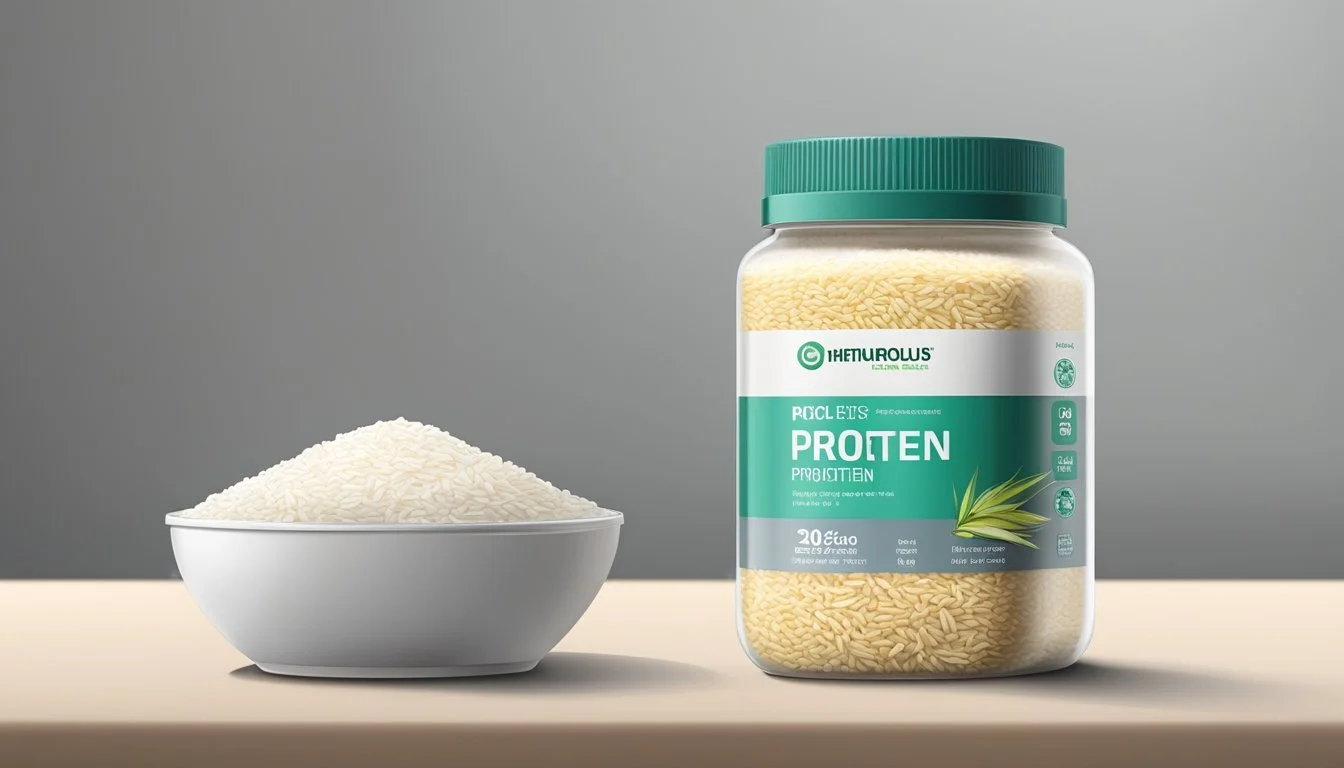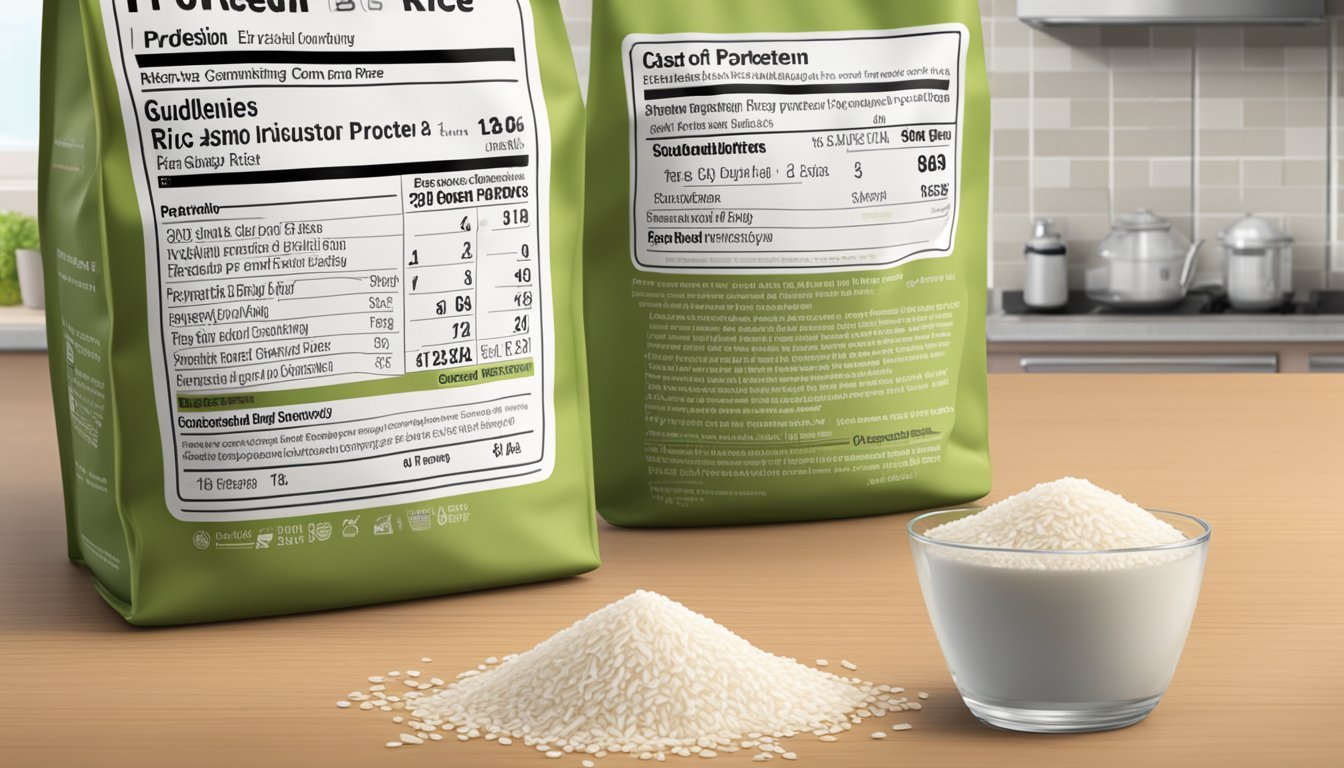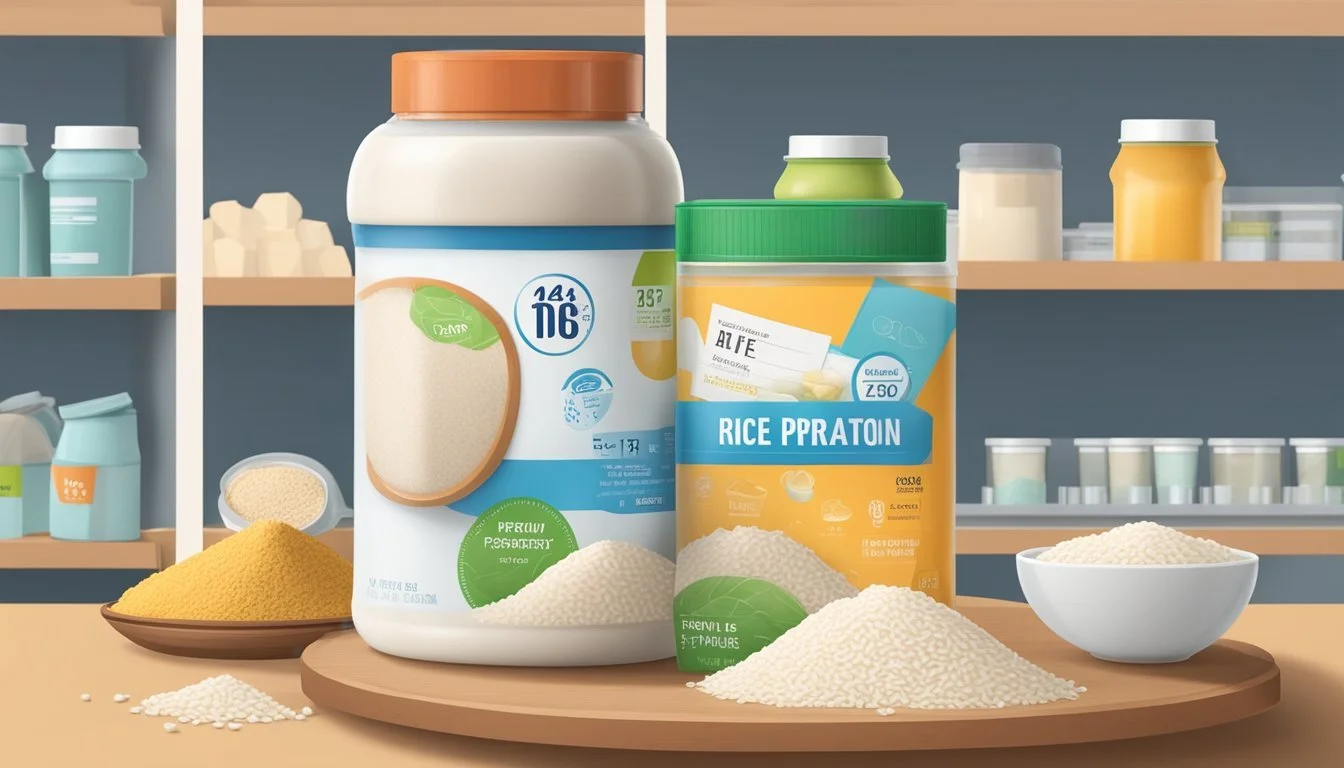Does Rice Protein Expire?
Shelf Life and Storage Tips Explained
The shelf life of rice protein powder and other protein powders is a common concern among fitness enthusiasts and health-conscious individuals. Rice protein powder typically has a shelf life of up to 24 months when stored in unopened containers at temperatures below 80°F. Proper storage conditions play a critical role in maintaining its quality.
Protein powders, including rice protein, can maintain their efficacy and safety if stored properly. Factors such as exposure to heat, moisture, and light can impact their shelf life. Therefore, it’s recommended to keep these products in a cool, dry place to ensure they remain safe for consumption even after the expiration date, provided there are no signs of spoilage like rancidity or off smell.
Storage and handling of protein powders are paramount in prolonging their usability. Ensuring that containers are tightly sealed and stored away from adverse conditions can help preserve their quality, ensuring that you get the most out of your investment in these dietary supplements.
Understanding Protein Powders
Protein powders are supplements that provide a convenient source of protein, essential for various bodily functions. They come in various forms and have different nutritional benefits depending on their source.
Types of Protein
Protein powders are generally categorized into animal-based and plant-based types.
Animal-based protein includes whey and casein, both derived from milk. Whey protein is popular for its quick digestion and rich amino acid profile, aiding in muscle recovery. Casein digests more slowly, providing a sustained release of amino acids.
Plant-based proteins include options like soy, pea, and rice protein. Soy protein offers a complete amino acid profile and is comparable to whey in terms of muscle-building benefits. Pea protein is easily digestible and hypoallergenic, while rice protein, particularly brown rice protein, is suitable for those with dietary restrictions.
Role of Protein in Nutrition
Protein is crucial for muscle growth, repair, and overall health. It provides the body with essential amino acids required for protein synthesis.
Whey and casein proteins are known for their high biological value, meaning they contain all the essential amino acids in optimal proportions. This makes them ideal for muscle recovery and supporting fitness goals.
Plant-based proteins like soy, pea, and rice protein offer a good alternative for those avoiding dairy. They are rich in vitamins and minerals, which can benefit overall well-being and support weight management.
Comparing Plant-Based and Animal-Based Proteins
Animal-based proteins like whey and casein are renowned for their complete amino acid profiles and rapid absorption rates, which support athletic performance and muscle recovery.
Plant-based proteins, including soy, pea, and rice protein, are excellent for those with lactose intolerance or dietary preferences. Though some plant-based proteins may lack one or two essential amino acids, combining different sources, such as pea protein with brown rice protein, can offer a complete amino acid profile.
Additionally, plant-based proteins provide additional nutrients like fiber, which aids digestion. This makes them a balanced choice for those looking to meet their nutritional needs while adhering to specific dietary practices or ethical considerations.
Shelf Life of Rice Protein
The shelf life of rice protein is influenced by various factors, including storage conditions and ingredient composition. Identifying signs of expiration is essential to ensure product quality and safety.
Factors Impacting Shelf Life
Rice protein powder typically has a shelf life of 1-2 years if stored correctly. Storage conditions play a significant role in preserving its quality. Keeping the protein powder in a cool, dry place away from direct sunlight is crucial. Moisture, heat, and light can degrade the product and shorten its usable life.
Using airtight containers can help in maintaining humidity levels low and avoid clumping. Additionally, the temperature should not exceed 80 degrees Fahrenheit to prevent spoilage. Ingredients such as preservatives also affect how long the protein powder remains good for use.
Manufacturers’ expiration dates should be noted, as they provide a timeframe within which the product is expected to stay fresh and safe.
Signs of Expiration
There are several indicators that rice protein powder has expired. Discoloration or changes in color can signal that the product is no longer good. A rancid smell or foul odor is another clear sign that the powder has deteriorated.
Clumping and changes in texture may occur due to high moisture levels. If the powder develops an off-taste, it's best to discard it. Checking for these signs regularly can prevent consumption of degraded protein powder and ensure safety. Following correct storage practices can minimize these risks and extend the shelf life.
It is essential to recognize and adhere to these signs to maintain the effectiveness and safety of rice protein powder.
Proper Storage of Protein Powders
Proper storage of protein powders, like rice protein, is crucial to maintain their quality and nutritional value. It's essential to pay attention to factors like temperature, humidity, and packaging to ensure the powder remains effective and safe for consumption.
Ideal Conditions for Preservation
Protein powders should be stored in a cool, dry place to prolong shelf life. High temperatures can degrade the protein, while excessive humidity can lead to clumping and potential spoilage. An ideal temperature is around 70°F with humidity levels at or below 35%.
Airtight containers are recommended to limit exposure to air and contaminants. Metal or glass containers with tight seals are optimal. If using the original packaging, ensure the seal is securely closed after each use. For extra protection, store the protein powder in a ziplock bag before placing it in a container.
Keeping the powder in a dark place, such as a pantry or cupboard, shields it from light, which can also degrade quality. Ensuring these conditions will help maintain the protein's texture and flavor.
Preventing Oxidation and Moisture
Oxidation is a common issue that affects protein powders. To prevent this, minimize air exposure by always resealing the container tightly. Vacuum-sealing options can further reduce oxidation risks.
Moisture is another concern. Even a small amount of water can cause protein powders to clump, making them hard to use and potentially leading to spoilage. Using a dedicated moisture absorber, like a silica gel packet, inside the storage container can help control humidity levels.
It's also advisable to avoid storing protein powders near appliances that emit heat, such as ovens and stovetops. These precautions will help in preserving the powder’s nutrients and preventing any contamination or spoilage.
Effects of Expired Protein Powder
Expired protein powder can pose several health risks and often loses its nutritional efficacy. It is crucial to understand both the potential dangers and the indicators of spoilage in expired protein powders to make an informed decision.
Health Risks and Nutritional Efficacy
Expired protein powder may present various health risks. The most immediate concern is digestive discomfort, including issues like bloating and diarrhea. This can occur because of bacterial growth or mold that commonly develops in expired powders. Allergies can also become more pronounced with expired products.
Another significant issue is the loss of nutritional value. The effectiveness of the protein diminishes over time, making it less effective for muscle recovery and growth. The manufacturer does not guarantee high quality beyond the expiration date. While it may still be safe to consume if it does not show physical signs of spoilage, the reduction in efficacy makes it a poor choice for nutritional supplementation.
Physical Indicators of Spoilage
Identifying spoilage in expired protein powder involves looking for several physical indicators. Changes in color or texture are clear signs. If the powder appears clumpy or has a different consistency, it is likely spoiled. A funny or off-putting smell also indicates spoilage, as proteins can develop unpleasant odors over time.
Mold and bacterial growth are serious indicators and health risks. Any signs of mold, such as visible spores or changes in powder's surface texture, indicate it should not be consumed. Proper storage can mitigate some of these issues but does not prevent spoilage indefinitely. Always check for these indicators to ensure the safety and quality of your protein powder.
Determining the Potency of Rice Protein
The potency of rice protein is influenced by its amino acid profile and the quality of the protein, as well as the impact of additives used in the product. Both factors play a crucial role in the nutritional benefits and overall effectiveness of rice protein powder.
Amino Acid Profile and Protein Quality
Rice protein contains a variety of essential amino acids necessary for muscle building and repair. Lysine, often limited in other plant proteins, is present but not in high quantities.
To evaluate protein quality, nutritionists consider the Amino Acid Score (AAS) and Protein Digestibility Corrected Amino Acid Score (PDCAAS).
Measurement Description AAS Measures the amino acid composition relative to a reference pattern PDCAAS Evaluates digestibility and absorption of the protein
Rice protein is often combined with other protein sources to balance the amino acid profile and enhance overall nutrition.
Effects of Additives on Protein Quality
The inclusion of additives such as emulsifiers and stabilizers can affect the quality and potency of rice protein powder. Common additives include maltodextrin and lecithin.
Maltodextrin is often added to improve texture and shelf life, but it can dilute the protein concentration. Lecithin, on the other hand, helps in mixing but does not significantly impact protein efficacy.
Proper manufacturing and storage conditions are also critical. When stored below 80°F, the protein retains its quality and nutritional value over time. Keeping an eye on additives ensures that the protein quality remains intact.
Guidelines for Consuming Rice Protein
Rice protein is a versatile dietary supplement popular among fitness enthusiasts and athletes. Proper usage and attention to expiration dates can help maximize its benefits.
Using Protein for Recovery
Consuming rice protein immediately after workouts can aid muscle recovery. Fitness enthusiasts and athletes typically need supplements to meet protein goals. For optimal recovery, they should consume 20-40 grams of protein per day, equating to 1-2 scoops.
Incorporating rice protein into post-workout shakes can speed up muscle repair. Balance it with carbohydrates for enhanced recovery. Rice protein absorbs at a medium-digesting rate, making it a suitable option between whey (fast) and casein (slow).
Interpreting Expiration Labels
Expiration labels on rice protein powders, such as best by, use by, and sell by, are crucial. These labels indicate peak freshness and maximum potency. Rice protein typically has a shelf life of 1-2 years if stored in a cool, dry place.
Using expired protein powder slightly past its date may still be safe but can lead to reduced nutritional value and potential gastrointestinal symptoms like bloating or upset stomach. Always check for changes in smell, taste, or texture to ensure the product remains safe.
Additional Considerations
When evaluating whether rice protein powder has expired and its continued effectiveness, several important factors come into play. These include its impact on fitness and health, as well as available alternatives to rice protein for achieving fitness goals.
Impact of Protein on Fitness and Health
Protein is essential for muscle growth and recovery, making it a critical component of fitness routines. Consuming expired protein powders can present health risks, such as a bitter taste or reduced nutritional value, potentially hindering fitness progress.
Quality storage of protein powders at temperatures below 80°F helps maintain potency. Both animal-based (whey, casein, egg white) and plant-based (pea, hemp) protein powders offer different benefits. For example, whey protein is quickly absorbed, aiding rapid muscle recovery, while casein protein releases amino acids more slowly. Understanding these distinctions aids in selecting the most suitable protein source for one’s fitness objectives.
Alternatives to Rice Protein
For those exploring different protein supplements, several alternatives to rice protein exist, each with unique benefits.
Whey Protein Powder: Known for fast absorption, it is ideal for post-workout muscle repair.
Casein Protein Powder: Provides a slow, steady release of amino acids, making it suitable for nighttime use.
Pea Protein Powder: Plant-based and hypoallergenic, it supports muscle recovery and fat loss.
Egg White Protein: Offers a high-quality protein source without fats and cholesterol.
Hemp Protein: Contains omega-3 fatty acids, beneficial for heart health and reducing inflammation.
Evaluating these options based on nutritional needs, dietary restrictions, and fitness goals ensures a well-rounded supplementation strategy.







